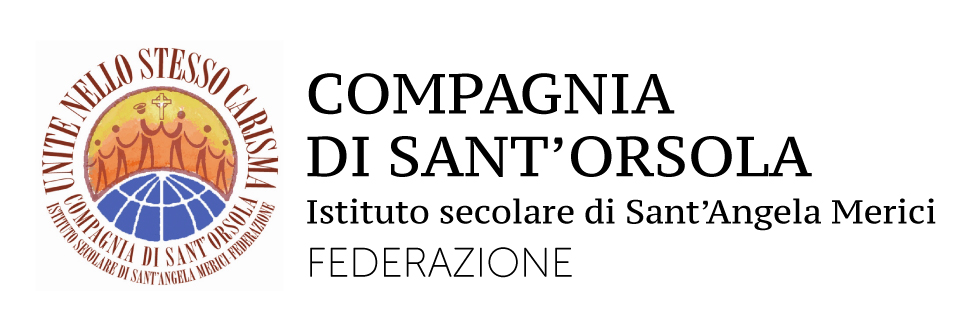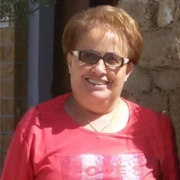Angela Randazzo and the Experience of Caritas
Angela Randazzo, of the Company of Caltanisetta, tells us about her experience at Caritas. On behalf of the Italian Conference of Secular Institutes, she represents the Italian Secular Institutes in the National Council of Italian Caritas.
Thanks to Angela for her valuable service and for sharing!
My commitment in Caritas began back in 1998 as a councilor, responsible for immigrants, in the diocesan council of the Diocese of Caltanissetta. My small village, called Delia, located in the center of Sicily in the province of Caltanissetta, with a little less than five thousand inhabitants, is a country that has always had a strong migratory flow. My own family starting with my father and all his family, all my brothers and sisters have emigrated to Argentina, Venezuela and Canada. I myself spent five years in Venezuela. This long experience of migration, certainly, has helped to create in me a particular sensitivity about this problem and has developed in me a particular attention to the people who today are forced to go through this same experience.
With the passing of time, our territory, strongly affected by the phenomenon of emigration, has found itself witnessing a reversal of the situation: from a country of emigrants we have become a country of immigrants, with a considerable presence of people from North Africa, Morocco and Tunisia and from Eastern Europe, Romania, Ukraine, etc.
In order to try to respond concretely to this new phenomenon, our diocesan Caritas established in Delia the Caritas Listening Centre for Immigrants, named “Marianna Amico Roxas,” as a tangible sign that our local Church feels close to the people living on the margins of our society, giving me the responsibility of coordinator of the Centre. The main objective of the Centre has been to develop in the community the culture of welcome and solidarity, which allows us to incarnate the commandment of love: “Love one another as I have loved you” (Jn13:34), through the services of listening, information, accompaniment, help in finding housing, work and integration into society, as well as the provision of basic necessities.
This year I was called to represent Secular Institutes in the National Council of Italian Caritas, an unexpected request and a very demanding task. On one hand I am honored. On the other hand, it is an increased responsibility. Caritas Italiana is a “pastoral body constituted by the Italian Episcopal Conference” to promote the witness of charity in the community in collaboration with other ecclesial bodies. It uses the various bodies provided for by the statute, among them the National Council, to achieve this objective.
The Council consists of: “three Bishops who are members of the Presidency; Director and Treasurer; one Delegate for each ecclesiastical Region (priest or deacon or member of an Institute of Consecrated Life, or Society of Apostolic Life, or lay person) appointed by the respective Episcopal Conference; four members appointed respectively by the Italian Conference of Major Superiors (CISM), by the Union of Major Superiors of Italy (USMI), by the Conference of Italian Missionary Institutes (CIMI) and by the Italian Conference of Secular Institutes (CIIS); of four lay people elected by the National Council of the Apostolate of the Laity” (Art. 11, Italian Caritas Statute).
The cordial, simple and familiar welcome of the director and the other members immediately made me feel at home. New horizons opened up, expanding my understanding of this institution, which operates on a local and international level.
Caritas Italiana was founded in 1971, at the behest of Paul VI, in the spirit of renewal initiated by the Second Vatican Council “to promote the witness of the charity of the Italian ecclesial community, in a manner appropriate to the times and needs, in view of the integral development of man, social justice and peace, with particular attention to the last and with a prevalent pedagogical function” (Art.1 Statute), always puts the person at the center by involving him/her in the search for solutions, making him/her a protagonist, in the hope of achieving autonomy in building his/her own future. Caritas carries this service forward through the daily action of almost 200 diocesan Caritas units throughout Italy, the Listening Centres, study and networking with other realities that provide their service to the poor.
This mission involves fundamental and constant formation work with the diocesan Caritas team and new directors, with the professional community of Caritas formators, in support of the integrated formation plan. The annual national conferences are significant moments of formation and culture. In 2019 the conference was held in Matera on the theme: “Charity is culture.” In 2020 the theme of the conference will be “Charity is mission”; it will take place in Milan.
In the field of immigration, the priority commitment is to promote the culture of welcome and respect for diversity. Caritas continues to carry on the project linked to “humanitarian corridors.” This means welcome in parishes, diocesan structures and communities, in families, but also promotion of projects on family reunification of refugees in Italy.
Young people commit themselves to civil service and summer volunteer projects. Collaboration with MIUR has developed attention to the school world, with competitions on welcoming and inclusive communities.
The commitment of Caritas Italiana is not limited to the Italian context, but extends to the various countries of the world through the accompaniment between local Churches with the implementation of micro-development economic and health projects. International emergencies have seen Caritas Italiana in the forefront with Caritas International, as with the earthquake in Iran and Iraq, the fires in Greece, the humanitarian crisis on the Angolan border of the Democratic Republic of Congo, the floods in Kenya and earthquakes and tsunamis in Indonesia, just to give a few examples.
In Syria the project was a mosaic of mother-of-pearl to share to denounce the horrors of war because art has always been a megaphone and can become a tool to rebuild societies torn by conflict.
In Venezuela, where a crisis defined as a “complex humanitarian emergency” persists, Caritas Italiana has carried out a wide-ranging humanitarian program throughout the country, both food aid and basic necessities, as well as health: drugs, health care and medical assistance. Also our Diocesan Listening Centre “Marianna Amico Roxas” has contributed by collecting medicines and welcome and help for many Italians and Italo-Venovuelans who have returned home because of the socio-political crisis. The crisis is still continuing, consequently also the action of Caritas.
In Kenya, through the Slumsdunk project, basketball has become the tool to build tomorrow: a basketball school has been opened in Mathare, offering basketball courses to young people and training for young coaches of the future promoting an alternative to street life. Already 20 boys and girls, thanks to the project, have obtained scholarships in the most prestigious schools in Kenya.
Several projects have also been carried out in Italy. I quote some examples.
In Reggio Emilia-Guastalla, with the project Building Signs of Hope, it was necessary to develop paths of proximity to poor people, offering them paths of constant accompaniment involving their home countries. In order to foster attitudes of concern for people in difficulty, teams of workers with different skills were set up to support pastoral units in taking on charitable works and hospitality as an authentic lifestyle of Christian communities.
In Fano-Fossombrone-Cagli-Pergola, the promotion of the “road home” project has tried to meet the many people and families who experience severe instability linked to housing: late payment, evictions, difficulties in finding housing. All this to give real help without forgetting the educational approach.
In Caltanissetta, Caritas has started its own grocery story in the centre of the city. Don Marco Paternò, diocesan assistant, presents this new reality in this way: “Its special quality is the dignity of the person, who does not receive a package to take home, but enters this small supermarket and chooses what s/he needs, as it is done in all supermarkets. The person shops with a card loaded with points, a way of empowering the person. For the community, the store has been a novelty, gradually raising awareness. In the first year, several volunteers from the parish Caritas unit have gotten involved. A beautiful network was born, which I hope will grow more and more.”
These are just some of the projects and commitments that Caritas carries out to bear witness to God’s love for human beings, for every person, especially for those who live on the margins of society. Welcoming the other, the nearness that is expressed by coming close, by sharing, by willingness to serve, not only helps people experiencing hardship, but also gladdens people experiencing being a gift [1].
Angela Randazzo
[1] The presentation of Caritas’ commitments and activities at national and international level, come from the 2018 Annual Report of Caritas Italiana.



